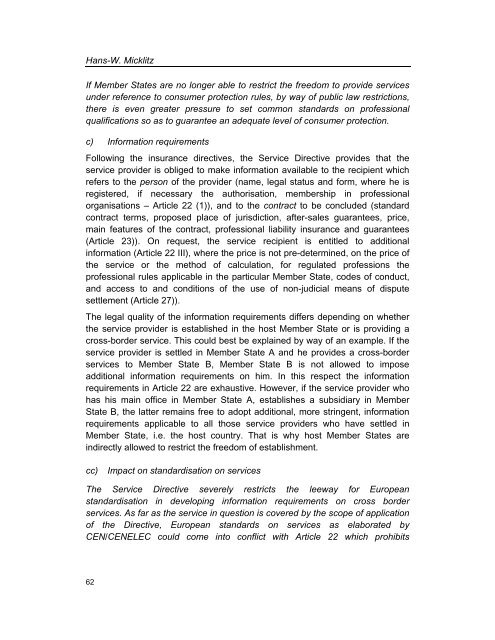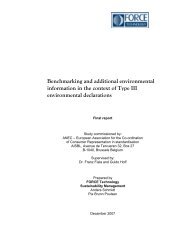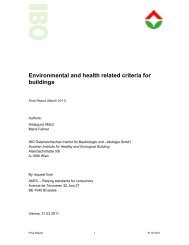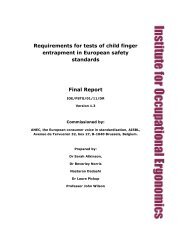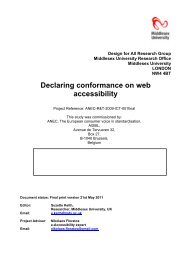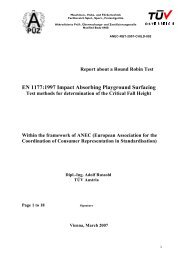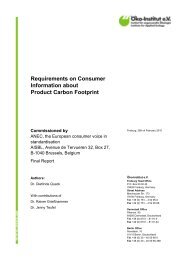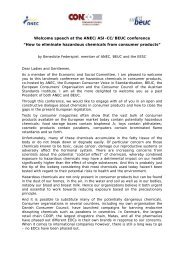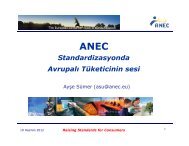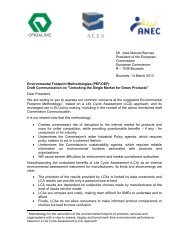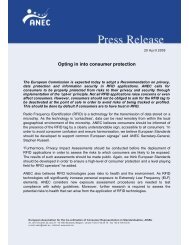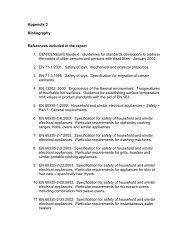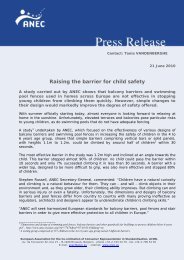Services Standards: Defining the Core Consumer Elements ... - ANEC
Services Standards: Defining the Core Consumer Elements ... - ANEC
Services Standards: Defining the Core Consumer Elements ... - ANEC
You also want an ePaper? Increase the reach of your titles
YUMPU automatically turns print PDFs into web optimized ePapers that Google loves.
Hans-W. Micklitz<br />
If Member States are no longer able to restrict <strong>the</strong> freedom to provide services<br />
under reference to consumer protection rules, by way of public law restrictions,<br />
<strong>the</strong>re is even greater pressure to set common standards on professional<br />
qualifications so as to guarantee an adequate level of consumer protection.<br />
c) Information requirements<br />
Following <strong>the</strong> insurance directives, <strong>the</strong> Service Directive provides that <strong>the</strong><br />
service provider is obliged to make information available to <strong>the</strong> recipient which<br />
refers to <strong>the</strong> person of <strong>the</strong> provider (name, legal status and form, where he is<br />
registered, if necessary <strong>the</strong> authorisation, membership in professional<br />
organisations – Article 22 (1)), and to <strong>the</strong> contract to be concluded (standard<br />
contract terms, proposed place of jurisdiction, after-sales guarantees, price,<br />
main features of <strong>the</strong> contract, professional liability insurance and guarantees<br />
(Article 23)). On request, <strong>the</strong> service recipient is entitled to additional<br />
information (Article 22 III), where <strong>the</strong> price is not pre-determined, on <strong>the</strong> price of<br />
<strong>the</strong> service or <strong>the</strong> method of calculation, for regulated professions <strong>the</strong><br />
professional rules applicable in <strong>the</strong> particular Member State, codes of conduct,<br />
and access to and conditions of <strong>the</strong> use of non-judicial means of dispute<br />
settlement (Article 27)).<br />
The legal quality of <strong>the</strong> information requirements differs depending on whe<strong>the</strong>r<br />
<strong>the</strong> service provider is established in <strong>the</strong> host Member State or is providing a<br />
cross-border service. This could best be explained by way of an example. If <strong>the</strong><br />
service provider is settled in Member State A and he provides a cross-border<br />
services to Member State B, Member State B is not allowed to impose<br />
additional information requirements on him. In this respect <strong>the</strong> information<br />
requirements in Article 22 are exhaustive. However, if <strong>the</strong> service provider who<br />
has his main office in Member State A, establishes a subsidiary in Member<br />
State B, <strong>the</strong> latter remains free to adopt additional, more stringent, information<br />
requirements applicable to all those service providers who have settled in<br />
Member State, i.e. <strong>the</strong> host country. That is why host Member States are<br />
indirectly allowed to restrict <strong>the</strong> freedom of establishment.<br />
cc)<br />
Impact on standardisation on services<br />
The Service Directive severely restricts <strong>the</strong> leeway for European<br />
standardisation in developing information requirements on cross border<br />
services. As far as <strong>the</strong> service in question is covered by <strong>the</strong> scope of application<br />
of <strong>the</strong> Directive, European standards on services as elaborated by<br />
CEN/CENELEC could come into conflict with Article 22 which prohibits<br />
62


